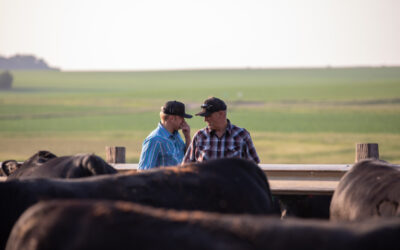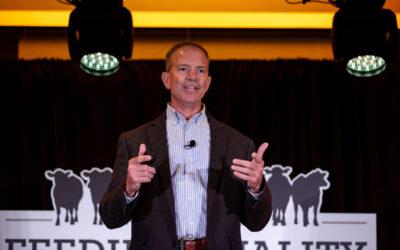
CAB partners on Kansas Angus feeding project
by Steve Suther
The Kansas Angus Association is working with Certified Angus Beef LLC (CAB) to better reward members or their customers as they learn more about carcass merit in their herds, or at least five representative spring-born steers. The 2011 Carcass Data Project (CDP) $5-per-head enrollment deadline of Dec. 15 allows participants couple of weeks for Dec. 28-30 delivery to the CAB-licensed McPherson County Feeders, near Marquette, Kan.
Steers must be sired by a registered Angus bull or bulls and carry individual identification such as ear tags. They must be weaned at least 45 days, backed by an approved vaccination program. CAB is sponsoring up to a $750 cash award, and brand merchandise including a jacket to the owner of the top CDP group of three.
“We applaud the Kansas Angus Association for a continuing effort to discover genetic carcass value in their members’ and customers’ herds,” says CAB assistant vice president Mark McCully. “This project serves as a great model for any group across the United States that wants to set up a similar program, and we at CAB invite partnership inquiries.”
McPherson County Feeders will mail bills twice a month for feed and yardage in the Kansas CDP. For more information or an entry form contact KAA secretary/manager Anne Lampe at kansasangus@wbsnet.org, 620-872-3915 or visit www.kansasangus.org.
System Over Scale
For Dallas Knobloch, it’s not about being the biggest feedyard—it’s about building a high-quality system that works. Today, with Tory’s wife Sadie and daughter Ivy, the Knobloch family owns and operates 4K Cattle. They feed 2,500 cattle at eight locations within 10 miles of home, manage 1,000 acres of crops and run a 125-head cow herd, all near Hills, Minn.
Data-Driven Progress and Partnerships
Discussions at Feeding Quality Forum reaffirmed the industry’s commitment to quality, transparency and innovation. With record Prime rates and strong consumer demand, producers who invest in genetics, health and relationships are positioned to drive progress and capture premiums.
Purpose Follows Passion
A chance opportunity. A change in career direction. And meat science was changed forever. Dr. Gary Smith originally had no plans to become a meat scientist. But thank goodness he did.



